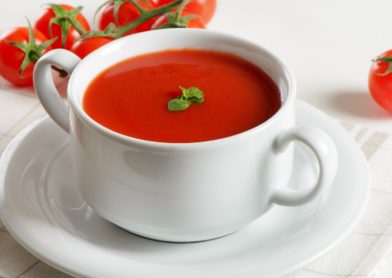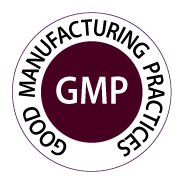Can pizza improve your vascular health?
Maybe not, if it’s loaded down with pepperoni and cheese. But the concentrated tomato puree in pizza sauce may very well be healthy!
Tomatoes and certain other red fruits are rich in a substance known as lycopene, a bright red carotenoid pigment linked to prevention of prostate and other cancer, and to endothelial health. As noted previously, the endothelium is a single-cell layer lining blood vessels, and it is crucial to regulating vascular health. Lycopene is a potent antioxidant, counteracting free radicals that attack the endothelium.
While lycopene or other beneficial compounds taken individually as supplements may improve health, it may be even better to eat tomatoes or other foods rich in a variety of these substances. The “Mediterranean diet,” emphasizing tomatoes, other fruits and vegetables, olive oil, and fish, appears to protect against cardiovascular disease.1
So careful attention to healthy dietary changes, such as skipping sausage on your pizza but cooking with tomato sauce, may help prevent atherosclerosis and heart disease even more so than taking dietary supplements.
Lycopene Improves Endothelial Function
In a trial in which participants were randomly assigned to receive 7 mg lycopene or placebo daily for 2 months, without knowing which treatment they were receiving, lycopene supplementation improved endothelial function in patients with cardiovascular disease, but not in healthy volunteers.1
Although blood pressure and lipids did not change in either group, the heart disease patients had a 53% increase in blood vessel dilation regulated by the endothelium, improving this measurement to levels seen in healthy volunteers! This was especially impressive as these patients were already on maximal medical preventive treatment including statins.1
In an analysis of six studies examining the effects of lycopene supplementation on blood pressure, 2 it significantly lowered systolic blood pressure (SBP; the higher number) by about 5 points, with no effect on diastolic blood pressure (the lower number). A higher dosage of lycopene supplement (over 12 mg/day) reduced SBP more significantly, especially in participants with high blood pressure at study entry and in Asians.
| Product | Serving Size | Lycopene (mg/serving) |
| Tomato juice | 250 mL (1 cup) | 25.0 |
| Tomato ketchup | 15 mL (1 tbsp) | 2.7 |
| Spaghetti sauce | 125 mL (1/2 cup) | 28.1 |
| Tomato paste | 30 mL (2 tbsp) | 13.8 |
As Good As Statins?
A separate analysis 3 of twelve studies of the effect of lycopene on serum lipids, and four studies of its effect on blood pressure, showed that lycopene, 25mg daily or more, lowered LDL (bad) cholesterol by about 10% which is similar to the effect of low doses of statins in patients with slightly elevated cholesterol levels.
As in the other analysis,2 lycopene supplementation significantly lowered SBP by about 5 points, but more studies are needed to prove potential benefits on SBP and on total serum cholesterol.3
Are Tomatoes Better?
A different analysis4 of 21 studies confirmed that lycopene supplementation significantly lowered SBP by about 5 points. Adding tomatoes to the diet significantly lowered LDL-cholesterol and IL-6, a marker of inflammation, while improving endothelial function measured by blood vessel dilation in response to blood flow. The researchers suggest that individualized nutritional strategies involving tomatoes may help combat cardiovascular disease.
Not all the evidence is positive, however. Moderately overweight, otherwise healthy, middle-aged individuals randomly assigned to a relatively high daily intake of tomato-based products (32-50 mg lycopene/day) or to lycopene supplements (10 mg/d) did not experience improvements in conventional risk markers of cardiovascular disease.5
Could it be that the right combination of dietary ingredients is needed to bring out the vascular benefits of tomatoes? A study 6 of nearly 40,000 middle-aged and older women initially free of cardiovascular disease showed that dietary lycopene was not strongly associated with cardiovascular risk. However, higher levels of tomato-based products, especially two or more servings weekly of tomato sauce and pizza, had a protective effect. This suggests that dietary lycopene or other healthful plant compounds eaten as oil-based tomato products have cardiovascular benefits.6
Except for blood pressure control, where lycopene supplementation may be more effective, clinical research supports eating more tomato-based foods as a first-line strategy for heart health.7,8
Let’s Get Cooking!
The best recipe for heart health may be Mamma’s home-cooked tomato sauce simmered for hours with extra virgin olive oil, onion and garlic! Cooking time and onion content result in greater availability of beneficial lycopenes in tomato sauce.9
Although tomatoes alone lower total cholesterol, triglycerides and markers of inflammation, while raising high-density lipoprotein (healthy) cholesterol, benefits are significantly greater when tomatoes are cooked in olive oil.10 So adding tomatoes to our diet, especially when slow-cooked in olive oil with onion, may please our health as well as our palate!
More:
How do tomatoes improve Vascular health?
How Does Lycopene Protect the Endothelium?
Tomato Sauce Enhances Benefits
What about Humans?
What about Other Produce?



